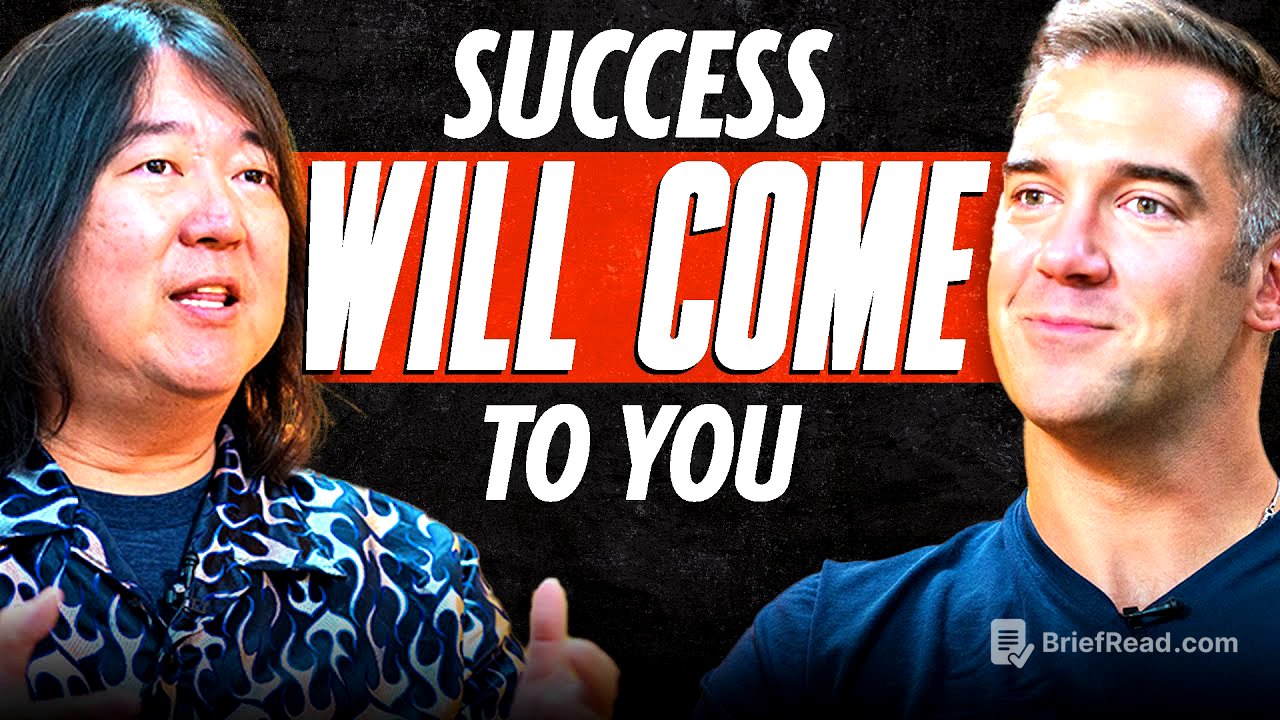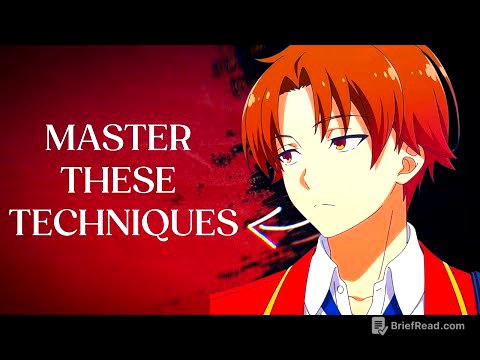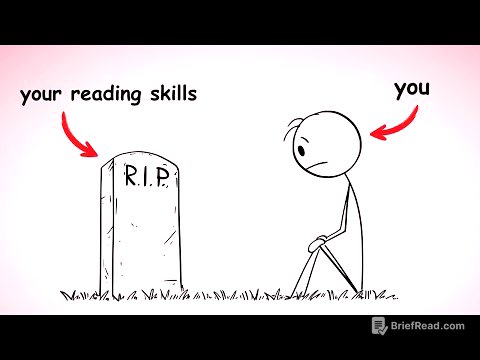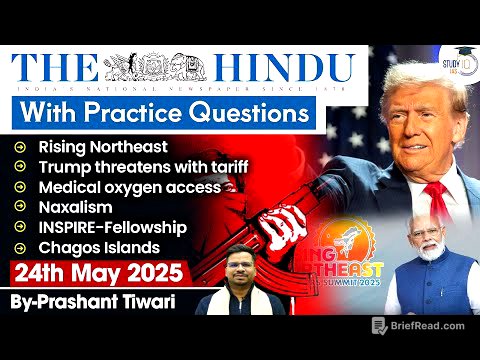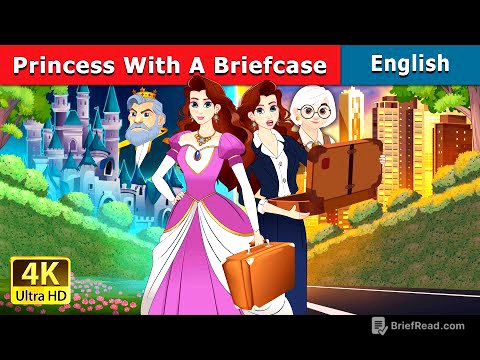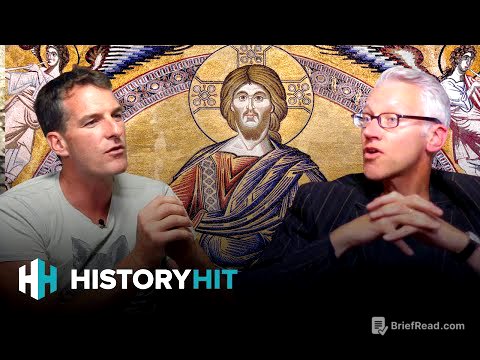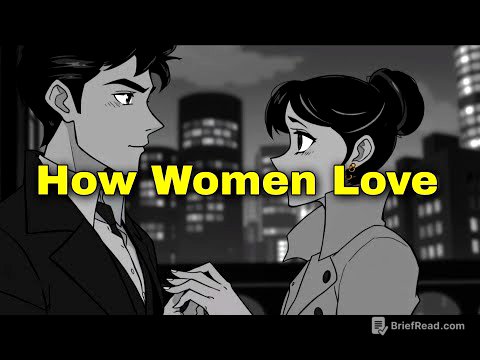TLDR;
This video features a conversation with Ken Honda, who shares his insights on money, happiness, and abundance. He emphasizes the importance of peace of mind over the pursuit of wealth, suggesting that focusing on what brings joy and fulfillment can lead to financial abundance. Honda also discusses the Japanese concept of "Arigato Money," which involves expressing gratitude for money, both when receiving and spending it, to foster a positive relationship with finances.
- Prioritize happiness and peace of mind over the pursuit of wealth.
- Focus on what brings you joy and fulfillment.
- Practice gratitude for money, both when receiving and spending it.
- Invest in relationships and contribute value to others.
- Be open to receiving both good and bad experiences without judgment.
Introduction: Happy Money and Peace of Mind [0:00]
Lewis Howes introduces Ken Honda, the author of "Happy Money: The Japanese Art of Making Peace with Your Money." The discussion begins with the observation that many people, especially in America, experience fear and anxiety related to money. Honda is asked about the possibility of achieving peace around money and how to shift one's mindset to create that peace.
Cultural Differences: Talking About Money in Japan vs. America [1:04]
Honda shares his experience of casually asking a close friend in North America about their annual income, which was met with shock. He explains that in Japan, it's more common to openly discuss finances among close friends. Honda believes that North Americans tend to equate their self-worth with their income, leading to shame and pride associated with money, which he finds unique to American culture.
Invisible Assets: Prioritizing Peace of Mind Over Wealth [2:56]
Honda talks about the secret to creating financial abundance, distinguishing between visible assets (financial wealth) and invisible assets (relationships, peace of mind). He argues that peace of mind is a precious invisible asset that many people sacrifice for money. Honda suggests prioritizing peace of mind and integrity, even if it means giving up the idea of becoming rich. His mentor, the "Warren Buffett of Japan," advised him to forget about money to truly learn about it.
Focusing on Enjoyment: The Path to Abundance [6:46]
Honda advises listeners to forget about money, at least temporarily, and focus on what's most important in their lives, such as family, hobbies, or causes. He believes that there are two paths in life: one that you enjoy and one that you don't. Many people choose the latter in pursuit of money, hoping to retire and then pursue their passions, but this often doesn't work out. Sacrificing happiness and peace of mind for money can make it difficult to find happiness later in life.
Enjoyment and Money Flow: Doing What You Love [9:42]
Honda explains that while doing volunteer work may not directly lead to financial gain, doing what you love can make you happier, less stressed, and more attractive, increasing your chances of making money if you choose to. He emphasizes that making money is just one aspect of life, and there are many other fields of happiness, such as self-image, contribution, and connectedness with nature. Focusing solely on business and money can blind you to these other areas.
Attracting What You Want: Clarifying Your Desires [12:28]
Honda believes that everyone attracts what they truly want, even if they complain about it. He uses the example of a student who consistently attracts "bad guys" to illustrate that she is a master of finding what she subconsciously desires. Clarifying who you should attract is more important than focusing on who you shouldn't. The tragedy, according to Honda, is that many people are confused about what they truly want.
Being Ready for Money: The Importance of Clarity [15:08]
Honda shares a story about a time when Lewis felt he needed money but his mentor told him that money comes when you're ready for it. Honda emphasizes the importance of clarity in understanding why you need money. He recounts an anecdote about someone wanting a trillion dollars without knowing what to do with it, suggesting that if you don't know what you'll do with the money, you don't need it. Money is a reward for what you give to the world.
Spending Your First Million: Mission and Passion [18:30]
Honda says that you don't need confidence, a college degree, or an MBA to make money; all you need is curiosity. If you're excited about how you'd spend your first million dollars, you'll find a shortcut to it. However, he notes that the first few million dollars are often wasted. Having a mission and passion for how to spend your money puts you on the right track, as the energy will support you.
Happiness vs. Wealth: Aiming for Happiness First [20:58]
Honda advises figuring out what you want in life, whether it's social success or personal happiness. He poses the question: Do you want to be a happy person or a wealthy person? While you can pursue both, the path to happy and wealthy people only has an opening to aim for happiness first. If you go after money, you're likely to lose everything, including your peace of mind.
The Florist Example: Love Over Cost-Cutting [22:19]
Honda illustrates his point with the example of two florists: one who always tries to cut costs and another who always brings in the best flowers and cares for them. He suggests that clients will gravitate towards the florist who loves flowers and cares about their customers' enjoyment, even if they don't focus on cost-cutting.
Financial Freedom and Happiness: Is It Possible for Everyone? [23:51]
Honda believes that it is theoretically possible for anyone to achieve financial freedom and stay happy. However, some people may not be interested in money. He emphasizes the importance of figuring out what's most important to you, as life can be filled with preparation for financial success at the expense of your most precious time. He shares insights from his book series, "17 Things to Do in Your Teens, 20s, and 30s," noting that many older, successful friends regret spending too much time and energy on business.
Building an Empire: A Human Gene? [28:01]
Honda suggests that the desire to build an empire may be embedded in human genes, referencing figures like Genghis Khan. However, he reiterates the importance of cherishing what you respect most in life now, as you cannot respect it in ten years. He emphasizes that your precious life is limited, and focusing mostly on business can lead to regret.
Value and Financial Reward: The Kindergarten Teacher Example [30:06]
Honda agrees that the amount of money we make is directly related to the value we bring to others. However, he notes that this calculation is limited to financial value. He uses the example of a kindergarten teacher who adds great value to a few children but may not be financially rewarded on a large scale. He suggests that the financial system is extreme and that a shift may be coming to make it more fair to older people.
The Trap of Comparison: Staying Away From Facebook [32:18]
Honda jokingly advises people to stay away from Facebook if they want to be happy, as it can make you feel miserable by constantly comparing yourself to others. He suggests using Facebook to congratulate friends and see what's possible for you, rather than feeling jealous or competitive.
Healing Financial Wounds: Turning Debt Into Trust [34:11]
Honda advises those in debt to change their perspective. Instead of viewing debt as a punishment or curse, see it as a trust placed on you by the bank or friends who believed in your earning ability. He suggests thanking the financial institutions for trusting you and viewing interest as a form of appreciation.
Honda's Financial Journey: A Life Without Struggle [37:21]
Honda admits that he has been lucky to live his life without struggling with money, thanks to his father's teachings. He has never borrowed money and has always bought real estate and cars in cash. Because of this, he cannot teach people how to get out of a bad financial place, as he has always been fairly wealthy.
Arigato Your Money: Thanking Your Money [38:46]
Honda shares another lesson from his mentor, who advised him to say "Arigato" (thank you) to his money. He explains that this means thanking money when it comes in and when it leaves, appreciating it for staying with you even for a short visit. This practice is based on the idea that the human mind can only focus on one thing at a time, so focusing on appreciating money makes you a magnet for it.
Thanking the People Behind the Services: A Domino Effect of Gratitude [41:48]
Honda expands on the idea of thanking money by suggesting that you also thank the people who provide the services and products you pay for. He uses the example of an electricity bill to illustrate the many people involved in providing that service. By thanking the money, you're also thanking all the people who will be paid with it, creating a domino effect of gratitude.
Complaining About Money: Making Money a Villain [46:48]
Honda explains that complaining about money can make money see you as an undesirable person to be around. He suggests that complaining makes money a villain, and you don't want a scary person living in your house. Happy, wealthy people see money as their best friend and welcome it into their lives.
Hypothetical Scenario: Losing Everything [48:49]
In a hypothetical scenario where Honda lost all his money, he says he would ask his friends to wire him money as a gift, rather than a loan. He would also ask his friends for a guest room or extra house to stay in. Additionally, he would ask his friends for advice on what he should do. Honda is confident that his friends would support him because he has supported them and others throughout his life.
Donating All Money: Buckminster Fuller's Inspiration [54:07]
Honda shares that his inspiration is Buckminster Fuller, who donated all his money on the eve of each year and started the next year with zero. Honda is enticed by this lifestyle and may do it in his 70s and 80s.
Money Buys Happiness: A Student's Story [56:01]
Honda shares a story about a student who lost everything and was diagnosed with cancer. After attending Honda's seminar for free, she manifested a jewelry designer job, financial independence, and a better partner within a year. She was proposed to by the owner of a jewelry store and got everything she desired.
Morning Routine of Millionaires: Fun and Appreciation [59:03]
Honda shares that he starts his day by thinking of fun things that will unfold during the day and thanking the experiences in his imagination. He also imagines the people he will touch through his work. Many Japanese millionaires have a little shrine in their homes where they pray for their customers, clients, and employees.
Relationships: The Importance of Partnership [1:04:17]
Honda emphasizes the importance of relationships, particularly partnerships. He believes that a good partnership can multiply your energy, while a bad one can diminish it. He is very picky about who he works with and trusts his team with his life.
Zen Approach to Investing: Investing in Virtue [1:07:26]
Honda shares that his zen master, Warren Buffett, advised him to invest in companies with virtue and a strong business code. He believes that companies that put money first will eventually fail. Honda also notes that when regular people start asking about investing, it's a bad sign, suggesting that we may be approaching the end of the capitalist system as we know it.
Investing in Friends: A Better Investment Than Bitcoins [1:11:07]
Honda advises investing in your friends by taking them out for dinner or giving something to your clients and customers. He believes this is a better investment than bitcoins or gold. If a financial crisis happens, your clients will remember you and be more likely to support your business. He shares his experience of giving away free booklets, which led to a publishing deal and the success of his books.
Investing in People: Building a Network of Support [1:14:50]
Honda and Lewis discuss the importance of investing in people and building a network of support. Lewis shares his experience of connecting people and helping them overcome their challenges, which led to a strong network of people who wanted to help him in return.
Final Lessons: Receiving Well [1:18:58]
Honda shares a final lesson from his mentor: focus on receiving well, both good and bad. He advises against judging things on the surface and trusting your intuition. Even if things don't go as planned, trust that the right door will open for you.
Three Truths and Definition of Greatness [1:24:18]
Honda shares his three truths: life can be more fun, life is more fun when unexpected events keep happening, and relationships are everything. His definition of greatness is knowing who you are and staying happy with it.
